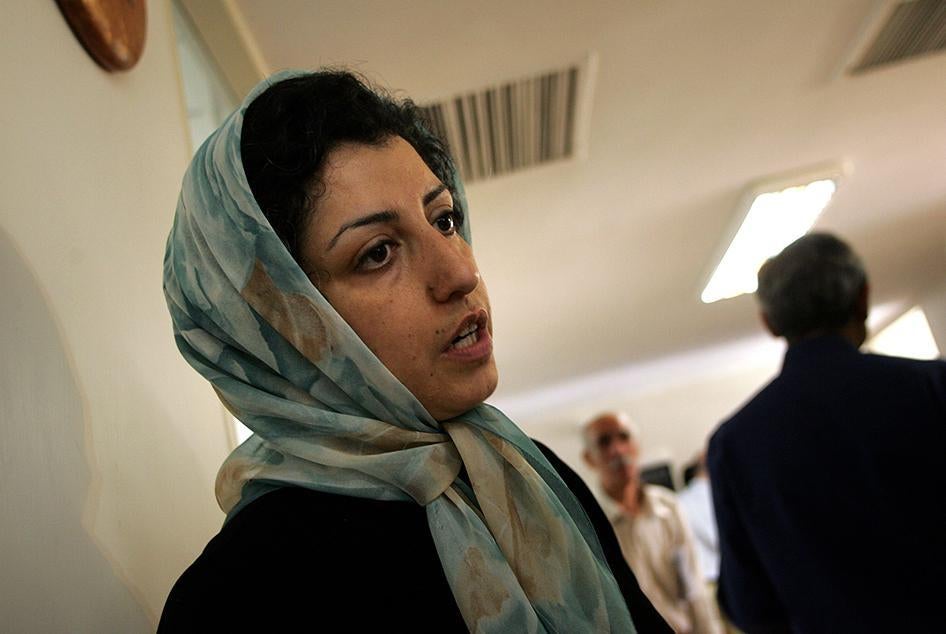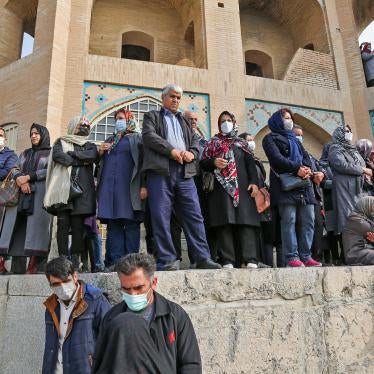(Beirut) – A prison sentence imposed on January 15, 2022, against a prominent rights defender demonstrates Iranian authorities’ commitment to crush any grassroots human rights efforts, Human Rights Watch said today.
Branch 26 of Tehran’s revolutionary court sentenced Narges Mohammadi, the rights defender, to six years in prison for “assembly and collusion to act against national security,” and to two years in prison and 74 lashes for “acting against national security and disrupting public order,” her husband, Taghi Rahmani, told Human Rights Watch on January 27. He said the summary trial was held behind closed doors and that she was denied access to a lawyer. On January 19, authorities transferred Mohammadi, who has been detained since November 2021, to Qarchak prison south of Tehran after she spent 64 days in solitary confinement in Evin prison.
“Iranian authorities’ cruel detention and prosecution of Narges Mohammadi only one year after she was released from an earlier prison term and then piling on more unfair prison sentences are clearly intended to crush her into silence at all costs,” said Tara Sepehri Far, senior Iran researcher at Human Rights Watch. “The authorities should immediately and unconditionally release Narges Mohammadi, who has already unjustly been imprisoned for years.”
Iranian authorities arrested Mohammadi in Karaj while she was attending a memorial service for Ebrahim Ketabdar, one of the hundreds of people killed during widespread protests in November 2019. The authorities proceeded to transfer her to the 209 ward of Evin prison which is under the supervision of Iran’s Intelligence Ministry. In May 2021, Mohammadi announced that she had been sentenced to 30 months in prison and 80 lashes for “propaganda against the political system … [and] slander and rebellion against the prison administration” relating to allegations against her that led to her filing of a complaint against prison authorities during her previous imprisonment.
In a letter published by the Defender of Human Rights Center on January 27, Mohammadi said that the prosecutor informed her of the new accusations on November 22 and she was taken to the prosecutor’s office on December 24 and informed that she would be formally charged. In the letter, Mohammadi said that she requested access to a lawyer in the session, but that the prosecutor denied her request.
Rahmani told Human Rights Watch that he understood that on January 12, in a trial that lasted no longer than five minutes, the judge insulted Mohammadi, and specifically mentioned Mohammadi’s recent nomination by two Norwegian parliament members for the Nobel peace prize and her efforts to shed light on the systematic use of prolonged solitary confinement against political prisoners as acts intending to tarnish the reputation of the system. Mohammadi did not have access to a lawyer during the trial.
Mohammadi’s letter said that her nomination has been included in the verdict as evidence for her conviction. The sentence also included a two-year ban on membership in political parties and “activities in social and digital platforms” as well as a two-year internal exile in Iran.
Mohammadi had been sentenced to 10 years in prison in May 2015 for “establishing an illegal group,” “assembly and collusion to act against national security,” and “propaganda against the state.” Authorities arrested Mohammadi after her meeting with Catherine Ashton, then the High Representative of the Union for Foreign Affairs and Security Policy, in Tehran. During her imprisonment in Tehran’s Evin Prison, she filed a complaint against prison authorities for physical abuse.
Mohammadi, who suffers from a serious neurological disease that causes muscular paralysis, was released from prison in October 2020 after her sentence was reduced but was denied a passport, which effectively barred her from uniting with her family in France. After her release, she and a group of other political prisoners filed a complaint against authorities concerning the prevalent use of solitary confinement against political prisoners.
“People like Narges Mohammadi are the ones who work to bring Iranian civil society together,” Sepehri Far said. “Governments that are engaging diplomatically with Iran should make sure to press the government to stop its relentless crackdown against human rights defenders.”









